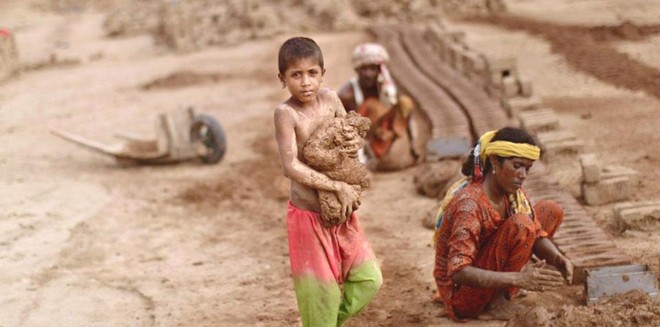

While other countries in the region with limited resource base are focusing on the development of their people, Pakistan continues to fumble on the fronts of development and human rights, which are necessary for economic development, democratisation and rule of law. One example of Pakistan’s fumbling is prevalence of what is termed modern slavery. Pakistan has been ranked number three in the world with high level of forced and child labour and human trafficking.
According to the Global Slavery Index report 2013 published by the Walk Free Organization of Australia, out of 29.8 million people in the world more than two million people are engaged in modern slavery-like conditions in Pakistan which include debt bondage, forced marriage, and sale or exploitation of children, human trafficking and forced labour.
The reasons cited by the report for existence of, what it terms, modern slavery in the world include weak economy, rising poverty, illiteracy, deteriorating security situation and rule of law and a growing population. All these factors make the poor vulnerable to different forms of servitude.
It further says that modern slavery is found in sectors like primary industries, manufacturing, commercial sexual exploitation, forced begging and domestic servitude. Two provinces -- Sindh and Punjab -- have the highest prevalence of bonded labour in agriculture and brick kiln industry.
Macro-economic policies, low level of social protection allocation and insufficient development budgets continue to haunt the country. One of the major reasons is informalisation of economy which has systematically continued over the past several years which has left deep imprints on the overall development and shaped the structure of society that continues to grow dangerous. More than 70 per cent labour force is associated with informal sector in Pakistan and of around 57 million labour force, a very small number of labour (nearly five per cent) is organised.
State of Pakistan has shown indifference to these very grave problems of modern times. For example, the state is responsible, under the Constitution of Pakistan, for extending social protection to the citizens. However, only 0.2 per cent of the GDP is allocated to social protection spending.
The country is also performing poorly on the human development front. The UNDP also released its 2013 Human Development Index (HDI) along with the report, which ranks countries in terms of economic and human development indicators. The Multidimensional Poverty Index, an alternative to income-based poverty estimates, shows the proportion of the population living in poverty is high throughout South Asia. In Pakistan, multidimensional poverty is 49 per cent.
The results revealed in the National Nutrition Survey of Pakistan 2011 also substantiate these reports and indicate a worrisome scenario. At national level, about 42 per cent of the households are food secure while the remaining 58 per cent are food insecure.
Literacy level in Pakistan continues to remain a serious concern despite the commitments Pakistan has made to increase it. According to the United Nations Development Programme, "Pakistan’s literacy rate, though having improved marginally over the years, remains considerably short of the MDG target of 88 per cent by 2015 at 58 per cent, and closer inspection reveals large gender and rural/urban disparities." Progress on MDG 4, in all but one target, is also off-track. In such conditions, people have to compromise with exploitative conditions to earn their bread and butter.
Pakistan is signatory to many international conventions on modern slavery including Slavery Convention, Supplementary Slavery Convention, Forced Labour Convention, Worst Forms of Child Labour Convention, CRC Optional Protocol on the Sale of Children, but hasn’t ratified UN Trafficking Protocol.
Another major challenge is that the budget allocated by the government to respond to modern slavery is not known. The responsibility of labour inspections rests with provincial governments since devolution of power. Also, the mandate of labour inspectorates differs from province to province under different procedures.
Green Rural Development Organization (GRDO) Executive Director, Dr Ghulam Hyder, says that these problems have emanated from the unequal and unjust distribution of resources. "Pakistan’s ruling elite and landed aristocracy have got hold over resources while the majority weaker sections of society have no or very little resources." He laments the lack of interest by successive governments in implementing the laws and international conventions.
Implementation of Bonded Labour System Abolition Act 1992 and its corresponding Rules 1995 is an example. So far, not a single case has been registered under this act. After the 18th Amendment, these rules fall under the domain of provinces. Punjab has enacted some laws on bonded labour.
The report also mentions domestic violence against women, forced marriages and traditions of Vani as other problems that plague the society. Though the Prevention of Anti-Women Practices Bill was passed in 2011, its enforcement is yet another stumbling block.
The government must ensure implementation of national laws which render modern slavery a crime. Besides addressing the problems of poverty, illiteracy and underemployment, the government should also ratify all the conventions/protocols of the United Nations on trafficking.